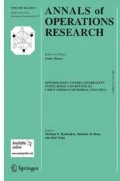Abstract
In this paper we propose a unified formulation based on (min ,+) algebra to express the dynamics of pull control policies for serial single product manufacturing systems. For policies such as basestock, kanban, extended kanban and generalized kanban, the formulation has the same parametric form with different parameters for each policy. To calculate these parameters efficiently, (min ,+) algebra tools are used. This formulation allows us to identify under what parameter values two different policies have the same dynamics behavior. This has been applied to extended kanban and generalized kanban.
Similar content being viewed by others
References
Baccelli, F., G. Cohen, G.J. Olsder, and J.P. Quadrat. (1992). Synchronization and Linearity: An Algebra for Discrete Event Systems. New York: Wiley.
Bollon, J.-M. (2001). “Etude de différentes politiques de pilotage de systèmes de production.” Ph.D. thesis, Institut National Polytechnique de Grenoble, LAG.
Bollon, J.-M., M. Di Mascolo, and Y. Frein. (2000). “Unified Formulation of Pull Control Policies Using (min, plus) Algebra.” In Conference IAR'2000, Nancy, France.
Bollon, J.-M., M. Di Mascolo, and Y. Frein. (2002a). “Calcul d'une formulation unifiée des politiques à flux tiré à partir des invariants.” Technical Report, Institut National Polytechnique de Grenoble, LAG, June 2002.
Bollon, J.-M., M. Di Mascolo, and Y. Frein. (2002b). “Unified Formulation of Pull Controlled Systems Producing Batches.” Technical Report, Institut National Polytechnique de Grenoble, LAG, February 2002.
Bonvik, A.M. (1996). “Performance Analysis of Manufacturing Systems Under Hybrid Control Policies.” Ph.D. thesis, Massachusetts Institute of Technology.
Buzacott, J.A. (1989). “Queueing Models of Kanban and MRP Controlled Manufacturing Systems.” Engineering Cost and Production Economics 17, 3–20.
Cheng, D.W. and D.D. Yao. (1993). “Tandem Queues with General Blocking: A Unified Model and Comparison Results.” Discrete Event Dynamic Systems: Theory and Applications 2, 207–234.
Dallery, Y. and G. Liberopoulos. (2000). “Extended Kanban Control System: Combining Kanban and Base Stock.” IIE Transactions on Design and Manufacturing 32(4), 369–386.
Karaesmen, F. and Y. Dallery. (2000). “A Performance Comparison of Pull Type Control Mechanisms for Multi-Stage Manufacturing.” International Journal of Production Economics68(1).
Lee, Y.-J. and P. Zipkin. (1992). “Tandem Queues with a Planned Inventories.” Operations Research 40(5), 936–947.
Liberopoulos, G. and Y. Dallery. (2000). “A Unified Framework for Pull Control Mechanisms in Multi-Stage Manufacturing Systems.” Annals of Operations Research 93, 325–355.
Monden, Y. (1983). Toyota Production System. Norcross, GA: Industrial Engineering and Management Press (Institute of Industrial Engineers).
Schrijver, A. (1986). Theory of Linear and Integer Programming. Wiley-Interscience.
Veatch, M.H. and L. M. Wein. (1994). “Optimal Control of a Two-Station Tandem Production/Inventory System.” Operations Research 42(2), 337–350.
Author information
Authors and Affiliations
Rights and permissions
About this article
Cite this article
Bollon, JM., Di Mascolo, M. & Frein, Y. Unified Framework for Describing and Comparing the Dynamics of Pull Control Policies. Annals of Operations Research 125, 21–45 (2004). https://doi.org/10.1023/B:ANOR.0000011184.94163.8c
Issue Date:
DOI: https://doi.org/10.1023/B:ANOR.0000011184.94163.8c




